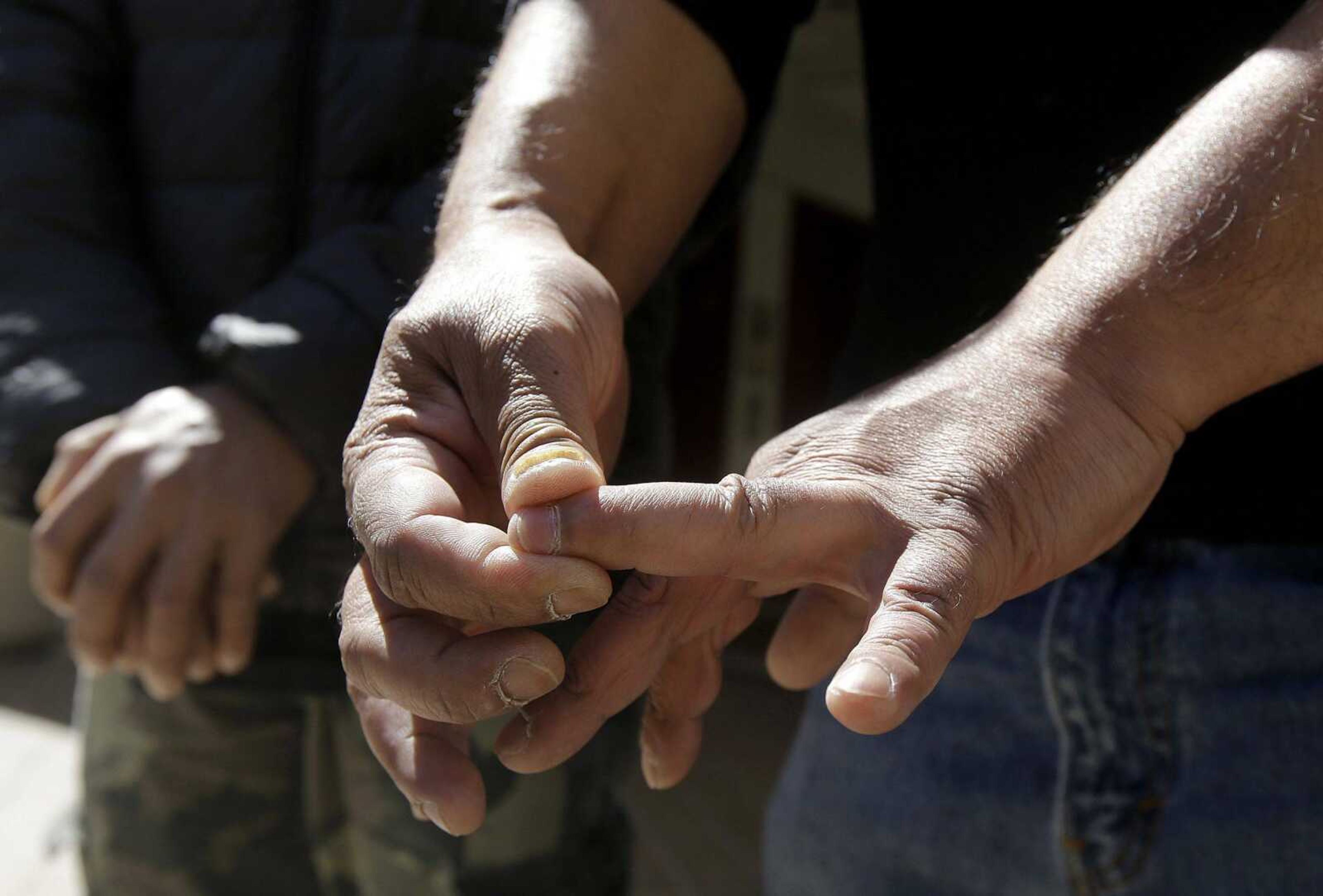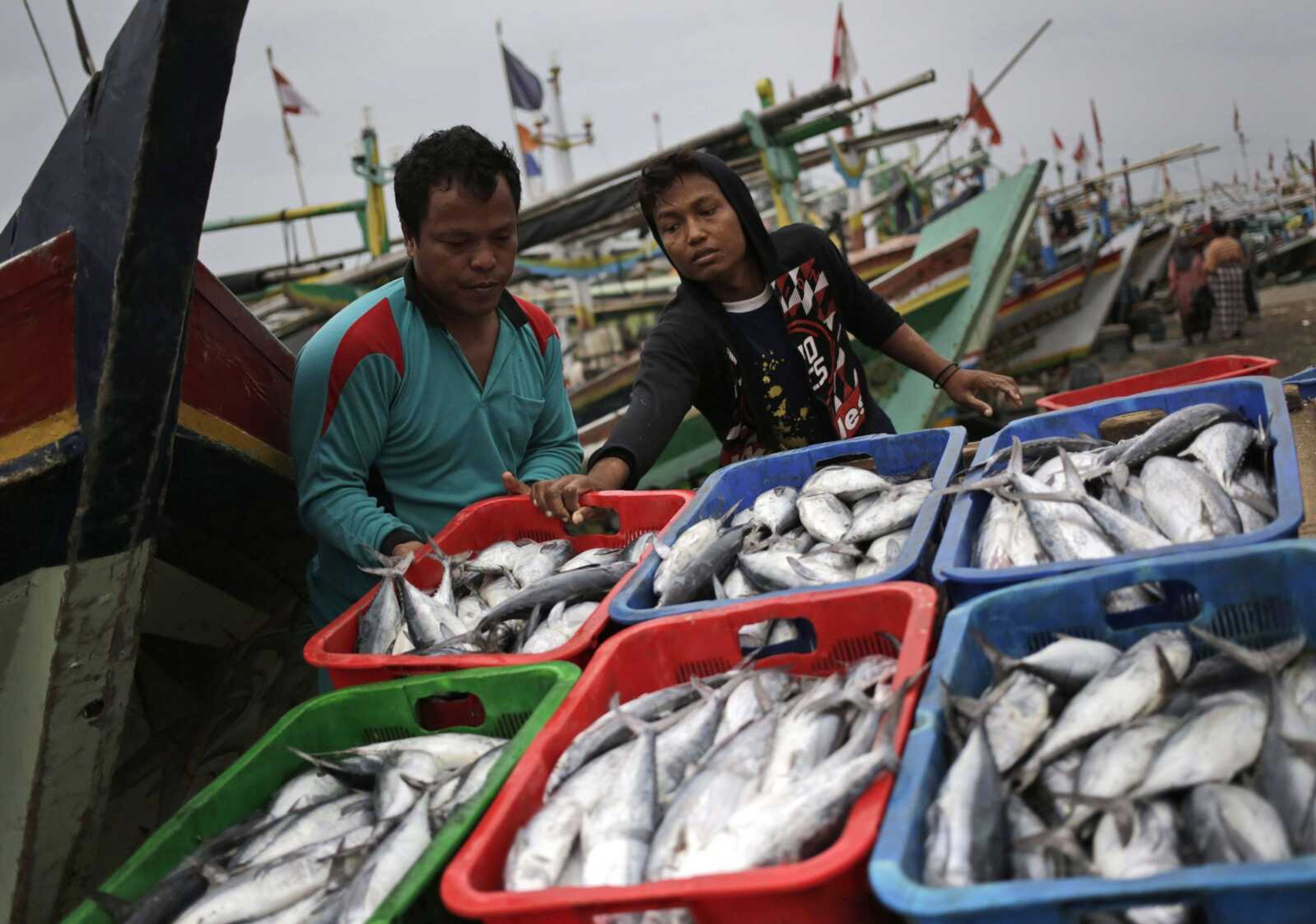Seafood caught by foreign crews confined on boats
HONOLULU -- Pier 17 doesn't even show up on most Honolulu maps. Cars whiz past it on their way to Waikiki's famous white-sand beaches. Yet few locals, let alone passing tourists, are aware just behind a guarded gate, another world exists: foreign fishermen confined to American boats for years at a time...
HONOLULU -- Pier 17 doesn't even show up on most Honolulu maps. Cars whiz past it on their way to Waikiki's famous white-sand beaches. Yet few locals, let alone passing tourists, are aware just behind a guarded gate, another world exists: foreign fishermen confined to American boats for years at a time.
Hundreds of undocumented men are employed in this unique U.S. fishing fleet due to a federal loophole that allows them to work but exempts them from most basic labor protections.
Many come from impoverished Southeast Asian and Pacific nations to take the dangerous jobs, which can pay as little as 70 cents an hour.
With no legal standing on U.S. soil, the men are at the mercy of their American captains on American-flagged, American-owned vessels, catching prized swordfish and ahi tuna.
Since they don't have visas, they are not allowed to set foot on shore.

The entire system, which contradicts other state and federal laws, operates with the blessing of high-ranking U.S. lawmakers and officials, an Associated Press investigation found.
The fleet of around 140 boats docks about once every three weeks, occasionally at ports along the West Coast, including Fisherman's Wharf in San Francisco, but mainly at Piers 17 and 38 in Honolulu. Their catch ends up at restaurants and premium seafood counters across the country, from Whole Foods to Costco, and is touted by celebrity chefs such as Roy Yamaguchi and Masaharu Morimoto.
Americans buying Hawaiian seafood almost certainly are eating fish caught by one of these workers, who account for nearly all the fleet's crew.
A single yellowfin tuna can fetch more than $1,000, and vendors market the catch as "sustainable seafood produced by Hawaii's hard-working fishermen."
But workers such as Indonesian Syamsul Maarif aren't protected or compensated like locals.
He was sent home to Indonesia after nearly dying when his boat sank 160 miles off Hawaii. He lost everything and said it took four months to get his pay.
"We want the same standards as the other workers in America, but we are just small people working there based on the contract that we signed," he said. "We don't have any visa. We are illegal, so we cannot demand more."
Over six months, the AP obtained confidential contracts, reviewed dozens of business records and interviewed boat owners, brokers and more than 50 fishermen in Hawaii, Indonesia and San Francisco.
The investigation found men living in squalor on some boats, forced to use buckets instead of toilets, suffering running sores from bed bugs and sometimes lacking sufficient food. It also revealed instances of human trafficking.
This report is part of the AP's ongoing global look at labor abuses in the fishing industry, stretching from Southeast Asia to America's own waters.
Last year, the AP reported on fishermen locked in a cage and others buried under fake names on the remote Indonesian island village of Benjina.
Their catch was traced to the United States, leading to more than 2,000 slaves being freed. But thousands more remain trapped worldwide in a murky industry where work takes place far from shore and often without oversight.
In Hawaii, federal contractors paid to monitor catches said they are troubled by what they've seen while living weeks at a time at sea with the men.
"You get that sort of feeling that it's like gaming the system," said Forest O'Neill, who coordinates the boat observers in Honolulu. "It's a shock. It becomes normal, but it's like, 'How is this even legal? How is this possible?' ... They are like floating prisons."
Under the law, U.S. citizens must make up 75 percent of the crew on most commercial fishing vessels in America. But influential lawmakers, including the late Hawaii Sen. Daniel Inouye, pushed for a loophole to support one of the state's biggest industries.
It exempted commercial fishing-boat owners from federal rules enforced almost everywhere else.
Thus about 700 foreign workers in Hawaii, who catch $110 million worth of seafood annually, lack certain labor rights most Americans take for granted.
They have little legal recourse in these areas and are detained on boats where U.S. Customs and Border Protection requires captains to hold the men's passports.
That potentially goes against federal human trafficking laws saying bosses who possess workers' identification documents can face up to five years in prison.
U.S. Attorney Florence Nakakuni, the chief federal law-enforcement official in Hawaii, said it's all above board.
"People say ... they're like captives," she said. "But they don't have visas, so they can't leave their boat, really."
Federal laws and rules don't mention the Hawaiian fleet by name; however, when specific details are combined, it's clear the language in the loophole applies to these boats.
"It has the fig leaf of legality," said Cornell University law professor Stephen Yale-Loehr, who, like other leading immigration experts contacted by AP, was unfamiliar with Hawaii's arrangement. "This is inconsistent with the general notion in American values, if not law, that workers should be paid a fair wage and not be mistreated."
Hawaii's fishing industry is otherwise one of the most tightly regulated for catch limits and sustainability, attracting companies that pride themselves on being ocean-friendly.
Supermarkets, restaurants and chefs selling the seafood condemned labor abuse.
President Barack Obama's recently expanded protections in Hawaii created the world's largest marine preserve but didn't address working conditions.
Honolulu's fleet gets only about 10 percent of its catch from the entire restricted area.
U.S. Customs and Border Protection and the Coast Guard routinely inspect the Hawaiian boats. At times, fishermen complain they're not getting paid, and officers say they tell owners to honor the contracts. But neither agency has any authority over actual wages.
"This is a unique situation," Coast Guard vessel examiner Charles Medlicott said. "But it is legal."
Connect with the Southeast Missourian Newsroom:
For corrections to this story or other insights for the editor, click here. To submit a letter to the editor, click here. To learn about the Southeast Missourian’s AI Policy, click here.









